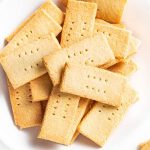 The word cracker meant many things before it came to refer to a kind of unsweetened wafer: when the word appeared in the early sixteenth century, it meant liar or boaster, then, in the late sixteenth century, it came to refer to a noisy firework, a firecracker; and finally, in the early seventeenth century, it came to mean a device used to shell nuts. Not until the early eighteenth century did cracker come to denote a dry, unsweetened wafer, and even then the word was used almost exclusively in North America; in England, dry, sodaraised wafers continued to be known as biscuits, a word that North Americans now use to refer to small, moist loaves made of yeast-dough. What these various senses of cracker have in common is the idea of a loud, sharp noise—a “cracking”: this is obvious with firecrackers and nutcrackers and even with soda crackers, which are so dry they make a cracking sound when bitten. Similarly, liars and boasters make a lot of noise, although this sense of cracking and cracker was probably also inspired by the resemblance of crack to croak, the sound a bullfrog makes when it wants to draw attention to itself. The boasting or liar sense of cracking and cracker is now almost obsolete, although a related sense still exists in idioms such as to crack a joke and wisecracks.
The word cracker meant many things before it came to refer to a kind of unsweetened wafer: when the word appeared in the early sixteenth century, it meant liar or boaster, then, in the late sixteenth century, it came to refer to a noisy firework, a firecracker; and finally, in the early seventeenth century, it came to mean a device used to shell nuts. Not until the early eighteenth century did cracker come to denote a dry, unsweetened wafer, and even then the word was used almost exclusively in North America; in England, dry, sodaraised wafers continued to be known as biscuits, a word that North Americans now use to refer to small, moist loaves made of yeast-dough. What these various senses of cracker have in common is the idea of a loud, sharp noise—a “cracking”: this is obvious with firecrackers and nutcrackers and even with soda crackers, which are so dry they make a cracking sound when bitten. Similarly, liars and boasters make a lot of noise, although this sense of cracking and cracker was probably also inspired by the resemblance of crack to croak, the sound a bullfrog makes when it wants to draw attention to itself. The boasting or liar sense of cracking and cracker is now almost obsolete, although a related sense still exists in idioms such as to crack a joke and wisecracks.
A slender, crunchy, flatbread with little or no yeast that may be rectangular or circular in form and is often adorned with grains of salt.
Crackers are thin, crispy biscuits made from unleavened dough that are often eaten with cheese, used in soup, or enjoyed as a snack with milk or a soft drink. The name “crackers” comes from the distinctive “cracking” sound they make when broken. Crackers can be made from a variety of flours and may be plain, salted, or sweet.
